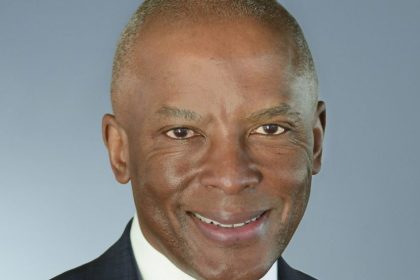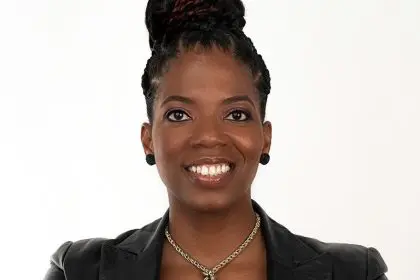Van Lathan is an established host and media personality from Baton Rouge, Louisiana, co-host of the Higher Learning podcast with Rachel Lindsay. Van’s passion for sports, entertainment, and news comes from his reporting and insightful interviews.
One of his passions involves artificial intelligence, just like rolling out publisher Munson Steed. The two sat down for a conversation, which we bring you here.
[Editor’s note: This is an extended transcription. Some errors may occur.]
Munson Steed: When you think about AI and the fact that we have to lean into it, what do you think the impact is for those who don’t lean in?
Van Lathan: Oh, interesting question. Well, I mean, I think there are a couple of questions. I think the broader question is, how the proliferation of AI and the evolution of AI affects us. Then the second question is: If we have a cultural and technological grasp on it, how do we use it to our advantage? So, the first question, I think, is actually more pressing. I think the question that a lot of people have to ask, and I think you see technology companies across the board asking this question, is: How do you use AI responsibly? How do you use AI to enhance the human experience? And human workforce development? And how do you stop it from becoming something that spreads like wildfire that we then cannot control? You know, not to be doom and gloom, but that is a possibility, right? Like, the technology is pretty limitless. I posted something on my Instagram not too long ago, and I told everybody you have to look at this because of the guy that was in this video wouldn’t have told you that the video was artificially engineered. You wouldn’t have been able to tell.
The question is, knowing that there is a responsible limit on how AI affects us, how do you utilize it? How do you then use it? How do you use it to your advantage? I think specifically for Black entrepreneurs/people who have difficulty scaling up, you know you can’t get the workforce in. It’s expensive. Your overhead is expensive. … and the capability of AI might be able to get you to where you’re trying to go a little bit faster. You might have less overhead. You might have less people you have to pay, less people you have to consult.
There are things that the technology is capable of.
That might help you get to a point where it was harder to get to before. Is the cost that you’re saving at that particular point in developing whatever business you’re trying to develop worth some of the potential pitfalls of the technology as it penetrates culture in a larger way? And really, we’re in the unknown. We’re in the front, in the unknown frontier, the Wild, Wild West, the final frontier, if you will. And we just don’t know the answer to those questions quite yet.
Munson Steed: Are we leaning in? Are you seeing the practical applications? I was in Morocco. So, you know, obviously English isn’t the first language in Morocco, and they hand me a menu. Guy says, “You speak English.” And he says “I’ll get you [the] English menu,” and we say, “Not necessary.” We put the Google over the menu. It translates the menu. The AI has already got it. … Are we moving in that direction in a healthy way, as a community…?
Van Lathan: I don’t think we know. Because we’re moving so fast that we haven’t been able to properly litigate the question. I don’t think that we know whether or not we’re moving in that way in a healthy way. Yet the technology that you just laid out is breathtaking.
It solves so many problems and answers so many questions. Right?
Like, you know, if you’re going on vacation, or if you’re going to a place — forget about vacation, vacation is something of luxury — it’s inconvenient when you go to a place you don’t speak the language right, but think about. If you’re in a business meeting and you’re on foreign soil, and their idiosyncrasies, or colloquialisms, or things like that that you don’t understand. Well, you’re playing an away game, you know. If you have something to assist you, to make sure that you are in simpatico, at least intellectually, with the people that are talking. Well, then, that’s a huge, huge weight off your back, right? And that’s a very valuable technology.
The question is like, What’s the trade-off like? I was talking to a dude at the gym one time, and he was showing me this program that he has on his camera, where he’s driving down Ocean and Santa Monica, and he’s he’s got the camera up, and it’s doing all of this stuff. And he’s telling me that the AI is actually filling in part of those pictures. It’s like, I’m like, man, how are you getting this stuff? He’s like, well, inside of this, the AI is like using everything that it sees to render all of this other stuff. It looks just like reality, and it’s also rendering his face, so the fact that it’s rendering his face and his entire likeness. The camera’s looking at him. The AI has to render him, then has to render everything around him.
I mean, the question is, with so much of our lives being played out on digital platforms. Right? Like, we’re Zooming right now and then. We’re gonna be on Instagram later and on Twitter. Later. I’m both Van Lathan, that you can see and touch and talk to and and Vibe with. But I’m also Van Lathan, the electronic and digital persona that exists on Instagram, and where you see him talk, and where you and all of that. Well, that guy can be recreated with enough input and with enough study.
So, is it worth it to have cool pictures for you to be a separate soul on a digital platform? Is it worth it to have the translation for your speech patterns, and the way that you talk and think to be uploaded into a cloud. That is only really the the only limit to that is imagination. That’s the question. That’s that we’re answering right now, and like it’s impossible to answer it because we just discovered the light bulb. Like we just we don’t know. So, the the thing to do right now, I would say, for everyone is to try first of all, to be intellectually curious enough to ask questions about AI and be brave enough to not feel like you have to have opinion. An opinion that falls on one side of the argument.
Munson Steed: Well, I mean, you know, that’s why we’re inviting you to RIDE, cause we truly want Give her you know. Somebody said, why you got Van coming? I said, Well, why not? I mean, I need a cultural intellectual cause Katt Williams put a hurting on black people and doing that. And obviously I listen to your show when you kind of gave a review or just some insight. But I do believe we’ve gotta take responsibility for not running from AI.
Because when you look at the avatars and the business models that are out to be purchased, there are so few avatars that look like you and I, which means for all those listening, there’s an opportunity. I think that you just described something that really, from an Afro-futuristic standpoint, allows us to revisit history, to recreate history. How will we recreate hip-hop, knowing what we know about what we can actually do? ‘Cause now, I can literally take a picture of what you said. I can think about George Washington Carver. I can go all the way to his lab in Tuskegee. I can look at every patent that he actually put in. And now I can teach the model to think about the technology and what he was thinking about, asking questions about each of his patents and have him based on his voice, recreate why he was bringing it to market, and what the thoughts are and the implications are. How do we revisit hip-hop? And now have a conversation with an Eazy-E on where you really were and what we really should be doing to protect ourselves in life. How do we recreate this? Because generative AI does is not dimension held.
Van Lathan: So easy is dead. And this is the way I look at that. What the divine laws of nature wanted us to get from Eric Wright we got from him and that was the good and the bad. We got the visionary, the iconoclast, the rebel, the genius, the musician, the criminal, the reckless hedonist. We got all of that. And in a life you get that from people. You know where I’m from, I tell people this all the time, it’ll just get when you when you at a funeral, and you looking down at somebody. That is a moment of reflection in Baton Rouge. It’s not a moment to remember everything that they did good. It’s a moment to remember what they wanted to do, what they were trying to do, what their hopes and dreams were, what they didn’t get a chance to do. Because a lot of times loving someone takes a great degree…of an imagination. Because you have to imagine where they would have been in different circumstances. And I think that’s very precious, and that’s a part of our natural life. That’s a part of who we are.
If you’re talking about a question of science, right, well, what could Einstein, George Washington Carver, Granville Woods, Madam CJ. Walker — all those people — have accomplished with more technology at their fingertips?
… I. think that the one problem the AI is going to pose, more than any other problem, is resurrection. I think we’re getting closer. We’re so close, my brother, to a point where human beings, both physically and emotionally and mentally, are thrust into a technological eternity. That is difficult to deal with, right? If you want to hear new pop right now, all of these AI records I’ll listen to them and guess what, they are good! You might want them to be bad. You might want them to sound bad. They don’t sound bad. They sound good. Timbaland made one. You mean to tell me if Timbaland has enough imagination to be a producer over three decades to make some of the most fire music of all time, you think [he] can’t produce a good record with Marvin Gaye? You think he can’t produce a good record with Sam Cooke? Do I wanna hear James Brown rappin’ with Tupac, with Biggie, and then we’ll have [Jay-Z] on the hook? Yeah, I do.
The question is always not, can we?, but should we? And it’s a question that we have to answer as a collective. Which parts of this are being unlocked for the good of all of us, and which parts of this are being unlocked for the good of capitalism? And I don’t have the answers, because, like I said, it was like, “Don’t listen to the AI raps.” I listen to ’em all, and I have fun with it. So, you know, [that’s] why you have conversations like we’re gonna have. And like I’m having with you right now, brother, because you want a lot of different voices in the room to be able to set expectations, particularly when we’re in in such a place that we are in now.
Munson Steed: I really want only a few voices in a room. … I think we have to have credible people who have a credible [voice]. The one thing I do believe Van is, you do have a vision for our people beyond the obvious. I think we are definitely in a moment where it’s beyond the obvious. I mean, you know, how much are they gonna offer Denzel [Washington]? Should Denzel really had 20 more movies when he was younger than he got offered? So Samuel [L. Jackson] had been able to have 20 more movies before? Should Chadwick really be able to come back and do more movies if his family chooses for his likeness to once again give emotions that can be captured and learned just in the hours of how, he responded. I think there’s a question there. What are they gonna offer? What’s that bond gonna be like? Will we be able to participate in that level of commerce so that we see it? You’re closer than me. What do you imagine seeing a Denzel in 20 more movies that were now written and directed by young black, entrusted people like an Ava [DuVernay] or somebody who’s really working to push the narrative on how Denzel would have really starred next to Sidney [Poitier], and and having that same conversation of re inviting or talking about. You know the, the Tulsa narrative where people say this is Wall Street. But if you’re ever in Tulsa, you know we don’t still own that. I mean, how that’s possible I don’t know, but even the people that they’re preserving we know their names. We know that there was a brother that ran the airline that was there in Tulsa. So we know there were oil man. But now we can have that conversation, and Madam CJ. Walker can literally be your entrepreneur tutor because if we get enough of her information she can tour you and George Washington [Carver] can tutor your child, and tell them why they should have a patent today and give them a rundown of what patents are? And in his own voice, is it important for us to feel Afro futuristic about this?
Van Lathan: It’s important for us to not be afraid of it. … It’s 40 million of us here in America — 40 or 45 million of us here in America. …As diverse as we are… there are very strong bonds that bind us, and one of those bonds is a trauma response and a fear of a lot of different things. That fear comes from the fact of just living in a survival matrix and everything trying to kill you right? There’s not like one area of American life that hasn’t tried to kill Black people. Military… The police… American ingenuity has been used against the citizenry of America, but particularly against Black people…
[Because of that,] the question is like, when you’re looking at AI… “How’s it going to hurt us?” That’s the first thing we have to get rid of forget about how is it gonna hurt? The question has to be, how’s it gonna help us? And that’s just an overall question of how we view participating in world economies and in culture, and to a larger scale, we have to ask those questions. But even like. you know, some of the stuff that you’re talking about. It’s exciting. but it’s not straightforward, and it’s not easy. Right?
Chadwick Boseman was a breathtaking performer, a gentleman, one of the best of us. Right? He passed away. And the way the natural order of things legislates this Earth is that now Black Panther, T’Challa, has to be played by somebody else, that we move on. We move past. We don’t continuously go backwards. We don’t continuously wonder what would have happened in 1975 or 1917 or 1925, we move forward. Technology is bordering on magic now. At first, you light the room with the filament and the light bulb, and then you light the entire world, and then you light the universe before you know you’re traveling at light speed. Now you’re doing prestigious. You’re doing magic. Now you’re doing magic, and a lot of this stuff is more magical than it is technological.
There’s this show that I watch. It’s called “Black Mirror.” I’m sure everybody listen to us has heard of blackmail. But there’s a specific episode of black mirror. It’s called San Junipero [season 3, episode 4]. And I won’t bore you guys with the entire rundown of of the episode. But what it’s essentially about is it’s about a technology that allows you to take your consciousness and upload it to the cloud. You have this choice before you pass on, that you can take your consciousness and upload it to the cloud and who you are, all your memories, your being, and all of that. Your consciousness goes into that cloud, and you can go wherever you want., do whatever you want. As long as that technology exists, you’re alive.
I mean, we’re talking about resurrecting people from the dead. So I guess my thing is, yeah, I would love to see what a young Denzel could have done, what a young Denzel and Samuel Jackson could have done together in 1986 or 1987. But there’s also a part of me that’s connected to the ground and the soil where I’m from, that just thinks their lives went the way they were supposed to go.
And if we’re making movies with those guys, what about the next generation of black creatives and young black men and women who need to be in these movies, who aren’t getting in them because we’re casting Denzel or Chadwick Boseman — rest in peace to our brother, what a beautiful man — in these movies! … I’m not saying that I wouldn’t like to see any of that ’cause I definitely would. But it’s all about checks and balances and what we deem to be okay. For who we are and the advancement and the humanity of us cause we don’t wanna become systems. We want to maintain our humanity.
Munson Steed: Well, you’ve got addiction. You’ve got some real health distances that all of a sudden a young brother who had never had an opportunity to meet you, can actually meet you. And his mom can actually bring you to his house each day, if you just sit down and dictate black male principles that I was never told before I was 21 Do I want key learning to kind of continue your thought process after you’re out? I would, because I think your your ideology will evolve, based on what the machine can learn whatever machine you chose to teach. Your thought processes are so they can meet you in another construct, and I do believe you’ve got to be believing that there’s another construct for us to allow Chadwick’s graduation speech at Howard to take its place in somebody’s movie. And I do believe we’re expanding the economy versus shrinking the economy with technology. So I’m very much about that. How do we take those constructs of social deals that you imagine AI beginning to at least have the ability to be a recovery coach that helps you in your addiction. And now it doesn’t cost you $1,000 because Van’s foundation funded the young brother who really wanted to bring treatment to his community. So, now you get a recovery coach for free.
Van Lathan: This is the most exciting thing about AI for me. The most exciting thing about AI is also the most the most frightening thing about it — is that it does things in the most efficient way. And what American culture doesn’t seem to be able to grasp is how inefficient biases, disparity and social ills are. There’s a sickness in the culture of our country that says that a sick white man has a better brain than a healthy black man. Right? And that means that if you’re black and you’re sick, then you have absolutely zero value. Doesn’t matter what kind of sickness it is. It doesn’t matter if you’re mentally ill, if you’re physically ill, if you have bad ideologies based upon the survival matrix that you grew up in, no matter what they are. Addiction is one of those things. Addiction is something that I’ve dealt with in my life with the people surrounding me because I come from a place where there are not a lot of things.
So, sometimes, when you don’t have a lot of things, you want to get your mind off the fact that you don’t have a lot of things. So you start using — a lot of different ways. You know, all of my family, a bunch of people dealt with that. Well, the AI or the computer program looks at that and they go, “Well. No. 1, what’s the best way to get you out of that?” Forget about whether or not society deems you worthy to live or not. Okay, what’s the best way to get you out of that right? What’s the best way? What’s the best set of practices? The best practices to make you whole again? Cut through all the red tape. It doesn’t negotiate whether or not you deserve to be a person. It just says, “This person is here. This person needs help. What’s the best way to help them? Also, something else is capitalization of the average American human being is not something that’s prioritized by our government, meaning, when I look at where I’m from — South Baton Rouge, Louisiana — I see a lot of people who could have been astronauts. I see a lot of people who could have cured cancer. I see us losing people that could be like contributors to the American social project. That’s what I see.
But they don’t see that. They see cattle and lambs to the slaughter the same way that they looked at those people in 1619. Same way they looked at them in 1719 and 1819 and 1919. They see a burden on the American economy and culture. So when they die, they’re happy. What they don’t see is what they could have done. Well, the computer looks for efficiency. The AI looks for the best way to do something. And so when it looks at the best way to do something, it’s saying, “Well, look, I mean those people and their potential could aid in society. How do we benefit them?” I think that’s another thing that troubles me about the AIs, because it might ask and answer questions that we’re not culturally ready to either ask or have answered, right? What happens when the American power system plugs the data into the computer, and the computer tells them that they’re wrong and that they’ve been wrong.
What happens when they say, “Hey, this group of people, if you incentivize their health, their freedom, and their creativity, then you’d be a better society?” What do they do then? So when I look at particularly what you’re talking about with addiction, I see a way to help people that’s free of the biases. Be free of the cultural norming and free of the cloud of prejudice and racism, sexism. homophobia, and all of those other things. I see a way to just do it clean. And the question is whether or not they’ll let that go.
Munson Steed: …What would AI say?
Van Lathan: …Genius is no different than anything else. Genius needs soil. It needs fertilizer. It doesn’t matter how smart, how brilliant, how amazing you are. You need water. You need sunlight. You need to grow, right?
I watched this show a lot, and I’ve been on the show before called, “The Food That Made America,” [and] “The Men That Made America.” All of that different stuff on the History Channel’s fantastic. But when I watched the show, particularly “The Food That Made America,” I see all these guys that have these great ideas for these products that we use all the time — Kellogg and that Kentucky Fried Chicken and all of that stuff. There’s always a part where they had the idea. And there’s another part…where they go, “He had the idea for Cornflakes, and then he went and secured a $300,000 loan.” And I’m like…$300,000 for a loan to start your company in Battle Creek, Michigan? When you’re trying to start Kellogg’s in 1905, or whatever it was, hat’s a pipe dream for my great-great grandfather. That’s not happening. You know what I mean?… It doesn’t matter what kind of cornflakes you got, if your name is Rufus Jenkins, Jr, and you go in there…they taking your cornflakes. … The guy who came up with the the recipe for Jack Daniels, and what they do? They jacked him is what they did. So, I think when you’re talking about the AI, it’s kind of a blank slate, right? It’s like, okay, ell, if you let a computer decide who has the best idea who should be funded, the computer might make decisions that culture is afraid to make. Once again, the computer might say, okay, well. “You need to spread this money around.” …Efficiency is the goal. So it’s going to look at what’s not being optimized. And if it looks at a whole culture or generation of people that don’t have access to something, it’ll say, “Well, if they had access to it, how much better could it be?” So, you know, all of that stuff excites me about the AI– divorcing the human element from some of these decisions, but I also think the human element of a lot of these things is very valuable, as well. Once again, it just depends on how deep we endeavor into it.
Munson Steed: Well, thank you for that, brother. Look forward to catching you at RIDE Con.
Van Lathan: [Check out] Rachel Lindsay, “Higher Learning,” every Tuesday and Friday …
Munson Steed: Yeah, she’s a gem, too. But thank you so much for coming on rolling out CEO to CEO. You’re a fabulous CEO.
















